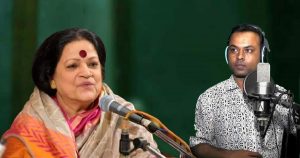The celebrations of Pahela Baishakh, the first day of Bangla New Year, are going on in full swing with much splendour as people in their thousands are thronging different popular meeting places in the capital and elsewhere across the country.
The whole country is in a festive mood as people from all walks of life hail the New Year 1421 with new hopes and aspirations for a better, peaceful future.Pahela Baishakh is an festival celebrated by the all the communities on the country with great enthusiasm and fervour holding various cultural programmes throughout the day.
The celebrations start with people partaking ‘Panta Bhat (watery rice)’ with fried hilsa, lentils, green chili and onions at home, restaurants and fairs following the rich tradition of Bangla culture.
Baishakhi mela (Fair) has been organised spontaneously in Dhaka city as elsewhere over the country. Business people welcoming their clients and offering them sweets to open new accounts books (haal Khata) by repaying dues of the past year. The fairs are marked for marketing of handicraft items seasonal fruits, sweets and sale and marketing of colourful kites of different varieties.
In Dhaka city thousands gathered at different venues in the capital, including Ramna Park, Suhrawardy Udyan, Central Shaheed Minar, Dhaka University, Shahbagh, and Dhanmondi Lake areas, to welcome the New Year amid pageantry.
Artistes from Chhayanaut welcomed the day with Tagore’s famous song ‘Esho hey Baishakh, esho, esho (come O Baishakh, come)’ under the banyan tree at the Ramna Park.
Students of the Institute of Fine Arts of Dhaka University, wearing colourful masks, took out a shobhajatra (procession) in the morning as part of the carnival.
Men wearing panjabi-pyjama and women attired in saris with red borders, and children in colourful dresses thronged traditional Baishakhi Mela (fair) and other cultural functions in the city and elsewhere in the country.
Mughal Emperor Akbar introduced the Bangla calendar in the year 1556 of the Gregorian calendar combining elements of lunar and solar calendar in a bid to streamline land tax collection in the then ‘Subah Bangla’ region, the much of which falls under Bangladesh. The day is a public holiday.
On the occasion, President Abdul Hamid, Prime Minister Sheikh Hasina and BNP Chairperson Khaleda Zia have issued separate messages conveying their New Year’s greetings to the people of the country and all Bangla-speaking people across the globe.
Traders and shopkeepers across the country open `Halkhata’ (new book of accounts) and entertain customers and visitors with sweets on the first day of the New Year as part of the tradition.
The celebrastion of Pahela Baishakh now popular in cities, is deeply rooted on rural Bangladesh. People in villages visit different Baishakhi fairs arranged all over the country.
State-owned Bangladesh Television (BTV) and Bangladesh Betar and the private TV channels are airing special programmes on the day.
Different socio-cultural organisations have chalked out elaborate programmes to celebrate the day. Bangla Academy, Shilpakala Academy and Nazrul Institute have organised separate cultural programmes to welcome the New Year. The Baishakh Udjapan Jatiya Parishad brought out a procession from the Central Shaheed Minar.
Extensive security measures were in place in the city for the day. Notably ten people were killed and many others injured in a powerful bomb blast during the Pahela Baishakh celebrations at the Ramna Batamul on April 14, 2001.
Dhaka Metropolitan Police and Rapid Action Battalion arranged separate control rooms at the Ramna Park. Besides, Rab’s helicopter remained on standby for emergency. GW Staff Reporter and agencies




